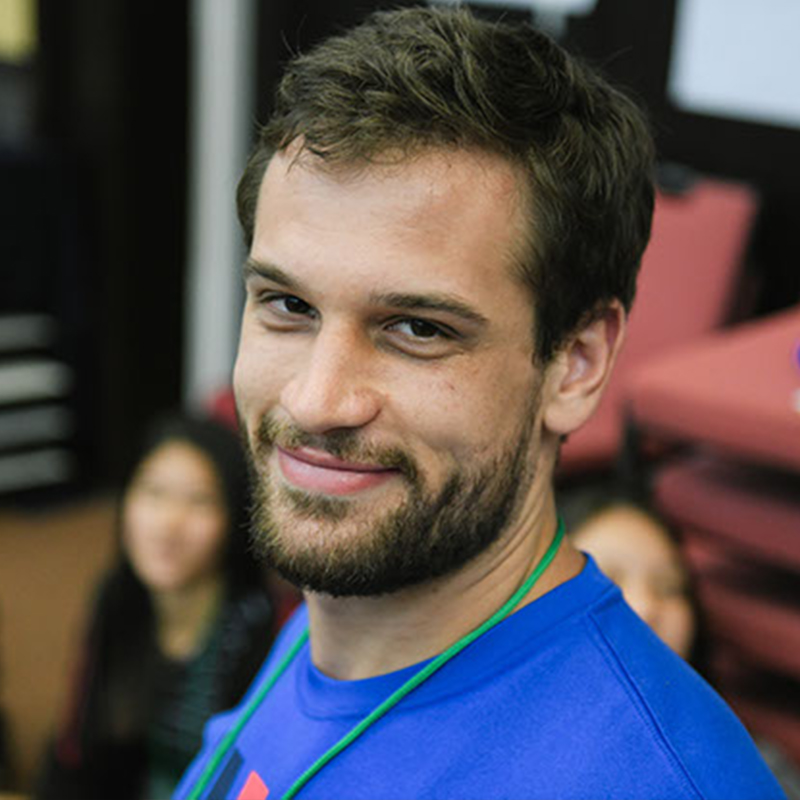
Faces of Sri Emas: Teacher Fred
As part of our ongoing series of taking a closer look at teachers and staff here, allow us to introduce Teacher Fred: At 28 years old, with two degrees in psychology in his pocket, it’s hard to believe he’s actually one of the longest tenured teachers here already. Find out more about him and his motivations to be a teacher right here.
Please tell us a little bit about yourself
My name is Fred, I’m 28 years old, and have been living in South-East Asia since I was 10. I believe in fitness, love reading about human behaviour and life on all aspects, and probably drink more coffee than is good for me. I started working at Sri Emas ever since we first opened in 2012 and teach history, biology, social skills, and psychology across different levels, also at Dwi Emas International School.
That’s quite a few subjects! Talk a little bit about how that came together.
History was the first subject I started teaching, and the first subject I experienced in Sri Emas. I think that it’s a great subject for lower-secondary students as it exposes them to different cultures and walks of life. I have taught biology to classes all the way from year 7 to 11. I think that biology is the best science to teach kids, because it encompasses all the other sciences and expresses it in one big picture which we now call life. I also teach psychology to the batch of A-level students that we have and it’s one of my favourite subjects because I spent a large amount of time studying it. I think that everyone should study it during pre-u or high-school.
Your subjects are sort of on opposing ends of the spectrum. Do you have a different approach to how you teach them?
Despite subject content being different, the approach is similar. Always start from the big picture and slowly move in to the details. In both subject I make sure that there are plenty of jokes or embarrassing personal stories that relate to the content to ensure that students don’t have a choice but to remember.
Talk a little bit about where you see the benefits in taking teaching outside of the classrooms, coursework and the like.
I think it’s a very valuable tool to get rid of the monotony of teaching on a whiteboard. It allows to shift around the energy when classes get dull. It also provides students the opportunity to look at and explore the information on their own terms without having to worry about keeping up with a teacher at the front of a class. Lastly, it also gives students opportunities to ask more questions about the topic that they likely wouldn’t have asked if it was merely taught.
What made you pick a career in teaching?
I always wanted to do something related to education ever since I was 16. My mum has been a teacher her entire career as well, so I was no stranger to the kind of work I would have to do. I chose to teach because it’s hard for me to find another profession that has as much an impact on the world. It’s very important to me to go home at night knowing I have done something meaningful, and teaching allows for plenty opportunities on that end.
So, if you weren’t a teacher, what profession would you have pursued?
If I wasn’t teaching information I would probably join in on the process of making new information through academic research in psychology. Probably around the areas of consciousness, morality, or evolutionary psychology.
What would you say is the hardest thing as a teacher?
Watching the students graduate after spending 4 years with them. They become a very central part of your day and I probably spend more time with them in school than with my own girlfriend which makes it hard to let go of them when their secondary education journey comes to an end.
In your opinion, what makes a good teacher?
Having struggled in education yourself. The smartest people usually don’t make the best teachers because they can take their intelligence for granted. Having struggled in school makes you aware of the hardships and roadblocks around the way, and a good teacher will be able to guide students over those hurdles more effectively if they themselves experienced it.
Were any of those subjects your favourite ones at school already or did you develop a liking for them only later on?
History was always interesting to me throughout school. Biology was a subject I struggled with in school and couldn’t really understand. I managed to find appreciation for it later in life, during my university studies. Looking at biology from a psychological perspective gave me a big picture view of the subject that then lead me to learn about it more. The cool thing is that psychology bridges history and biology pretty well as both are essential building blocks of the subject.
What would you say has been your favourite moment so far as a teacher?
The most memorable moment I had as a teacher was during a quiz run by a Year 8 class. Both teams had prepared questions to quiz each other with. Usually these games sparkle up the competitiveness in students, which is what I was expecting. During the quiz however, it was the turn of one of the most reserved girls I have taught up until that point and she was having a hard time stepping up to be questioned. Her own group was very supportive, encouraging her to step up, but what made this my favourite moment was that the opposing team also stepped up, encouraging her, reminding her that the points don’t matter, and that it’s all about learning. It sounds and felt like a scene in a movie, and I was truly caught off guard by how mature and incredibly supportive they behaved. Couldn’t have been more proud.
That about wraps it up for us but we’ve got one last question: If there was only one thing you’d want your students to take away from you, what would it be?
Becoming an adult usually involves losing that child-like sense of wonder, and watching prior batches grow up allowed me to see that to some extent. I would want them to keep that energy they brought to my classroom and continue learning just like that even once they graduate and start working. If I had to give a cliché answer to this question I would impart that they should pursue that which they think is meaningful, and not what is expedient.
